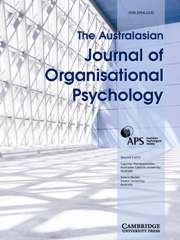Crossref Citations
This article has been cited by the following publications. This list is generated based on data provided by
Crossref.
Watson, Sarah B.
Goh, Yong Wah
and
Sawang, Sukanlaya
2011.
Gender Influences on the Work-Related Stress-Coping Process.
Journal of Individual Differences,
Vol. 32,
Issue. 1,
p.
39.
Goh, Yong Wah
Sawang, Sukanlaya
Oei, Tian P.S.
and
Ranawake, Don S.
2012.
An Asian Perspective of Occupational Stress Coping Model: A Case Study of Sri Lankan Employees.
The Australian and New Zealand Journal of Organisational Psychology,
Vol. 5,
Issue. ,
p.
25.
Glaser, Wendy
and
Hecht, Tracy D.
2013.
Work‐family conflicts, threat‐appraisal, self‐efficacy and emotional exhaustion.
Journal of Managerial Psychology,
Vol. 28,
Issue. 2,
p.
164.
Khalil, Amani A.
and
Abed, Mona A.
2014.
Perceived Social Support is a Partial Mediator of the Relationship Between Depressive Symptoms and Quality of Life in Patients Receiving Hemodialysis.
Archives of Psychiatric Nursing,
Vol. 28,
Issue. 2,
p.
114.
Whitley, Deborah M.
Fuller-Thomson, Esme
and
Brennenstuhl, Sarah
2015.
Health Characteristics of Solo Grandparent Caregivers and Single Parents: A Comparative Profile Using the Behavior Risk Factor Surveillance Survey.
Current Gerontology and Geriatrics Research,
Vol. 2015,
Issue. ,
p.
1.
Bani-Hani, Manar Ali
Hamdan-Mansour, Ayman M.
Atiyeh, Huda Mohammad
and
Alslman, Eman Tariq
2016.
Theoretical Perspective of Job Demands Correlates among Nurses: Systematic Literature Review.
Health,
Vol. 08,
Issue. 15,
p.
1744.
Gomes, A. Rui
Faria, Susana
and
Lopes, Heitor
2016.
Stress and Psychological Health.
Western Journal of Nursing Research,
Vol. 38,
Issue. 11,
p.
1448.
Eslami Akbar, Rasool
Elahi, Nasrin
Mohammadi, Eesa
and
Fallahi Khoshknab, Masoud
2017.
How Do the Nurses Cope with Job Stress? A Study with Grounded Theory Approach.
Journal of Caring Sciences,
Vol. 6,
Issue. 3,
p.
199.
Pezaro, Sally
Pearce, Gemma
and
Bailey, Elizabeth
2018.
Childbearing women's experiences of midwives' workplace distress: Patient and public involvement.
British Journal of Midwifery,
Vol. 26,
Issue. 10,
p.
659.
Butts, C. Missy
and
Gutierrez, Daniel
2018.
Using Acceptance and Commitment Therapy to (Re)conceptualize Stress Appraisal.
Journal of Mental Health Counseling,
Vol. 40,
Issue. 2,
p.
95.
Sawang, Sukanlaya
and
Newton, Cameron J.
2018.
Defining Work Stress in Young People.
Journal of Employment Counseling,
Vol. 55,
Issue. 2,
p.
72.
Gonzalez-Cifuentes, Carlos Eduardo
Cañas-Sánchez, Ericka
Olaya-Higuera, Martha
and
Nieto-Silva, Carlos
2019.
Adaptación, validación y propiedades psicométricas de la “Escala de Evaluación del Estado de Crisis” (EEEC), en una muestra de estudiantes técnicos y universitarios en Colombia.
Psychologia,
Vol. 13,
Issue. 1,
p.
73.
Herman, Keith C.
Reinke, Wendy M.
and
Eddy, Colleen L.
2020.
Advances in understanding and intervening in teacher stress and coping: The Coping-Competence-Context Theory.
Journal of School Psychology,
Vol. 78,
Issue. ,
p.
69.
Li, Xiaomin
Lam, Chun Bun
and
Chung, Kevin Kien Hoa
2020.
Linking Maternal Caregiving Burden to Maternal and Child Adjustment: Testing Maternal Coping Strategies as Mediators and Moderators.
Journal of Developmental and Physical Disabilities,
Vol. 32,
Issue. 2,
p.
323.
Obbarius, Nina
Fischer, Felix
Liegl, Gregor
Obbarius, Alexander
and
Rose, Matthias
2021.
A Modified Version of the Transactional Stress Concept According to Lazarus and Folkman Was Confirmed in a Psychosomatic Inpatient Sample.
Frontiers in Psychology,
Vol. 12,
Issue. ,
Jobe, Judy A.
Gillespie, Gordon L.
and
Schwytzer, Deborah
2021.
A National Survey of Secondary Traumatic Stress and Work Productivity of Emergency Nurses Following Trauma Patient Care.
Journal of Trauma Nursing,
Vol. 28,
Issue. 4,
p.
243.
Fiaz, Sumbol
and
Qureshi, Muhammad Azeem
2021.
How perceived organizational politics cause work-to-family conflict? Scoping and systematic review of literature.
Future Business Journal,
Vol. 7,
Issue. 1,
Rajan, Santhosh Kareepadath
Thomas, Mebin Wilson
and
Vidya, P.
2021.
Emotional Intelligence as a Predictor of Police Operational Stress: A Pilot Study.
Journal of Police and Criminal Psychology,
Vol. 36,
Issue. 3,
p.
568.
Marcatto, Francesco
Di Blas, Lisa
Luis, Ornella
Festa, Simone
and
Ferrante, Donatella
2022.
The Perceived Occupational Stress Scale.
European Journal of Psychological Assessment,
Vol. 38,
Issue. 4,
p.
293.
Mun, Soyeon
Moon, Yoosun
Kim, Hayeseul
and
Kim, Namhee
2022.
Current Discussions on Employees and Organizations During the COVID-19 Pandemic: A Systematic Literature Review.
Frontiers in Psychology,
Vol. 13,
Issue. ,




